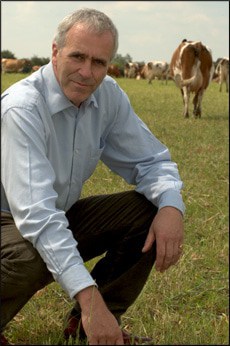Greenhouse Pioneer: Patrick Holden, Soil Association

Writer Anna Shepard talks to Patrick Holden, director of the Soil Association whom, we think, is a renaissance man amongst ecologists. He works the system to push for healthier food, and works the land with his own bare hands. We like that in a man.
 Eco Heroes are people and organizations that inspire us.
Eco Heroes are people and organizations that inspire us.
We think they deserve some recognition for leading, teaching or encouraging us in the quest to do our bit to help save the planet and are excited to have this blog as a platform to shine the spotlight on those we admire.
Here, writer Anna Shepard talks to Patrick Holden, director of the Soil Association whom, we think, is a renaissance man amongst ecologists. He works the system to push for healthier food, and works the land with his own bare hands. We like that in a man.
How would you describe yourself?
Farmer, campaigner and citizen of planet earth.
What is your mission?
To prepare the planet’s food systems for future generations. I want to harness the power of public opinion to drive fundamental change. The ultimate aim is to give power back to individual citizens, so that they can nourish themselves, their own health, that of their children and their community.
What do you care passionately about?
Rebuilding our food and farming systems from the ground up. Our current intensive food system is completely unsustainable. I also believe that the ecological crisis has a cultural and spiritual counterpart. It’s not just about material change; we must put the culture and meaning back into our food. We could convert the whole world to organic farming, but if we didn’t put the meaning back into food, it would be an empty victory.
What challenges do we face?
The scale of restructuring food systems is one of them. It’s going to be similar to a war effort – but we haven’t got a war and most people aren’t even aware there’s a problem. For consumers, the challenge will be to stop being disconnected from our food. We have to combat massive public ignorance about the central importance of food to our lives. A generation of children are growing up thinking that food comes from the supermarket. Meanwhile, the organic movement must fight the vested interests of multinational chemical and food companies and address the charges of elitism demonstrating that everyone has the right to a healthy and nutritious diet.
Why is organic so important?
It’s a system of food production that is good for you and also good the planet. The organic system is the best holistic approach for sustainable farming. Over the past decades, we’ve made the mistake of placing power of food production in fewer and fewer hands. Something urgently needs to be done – what is at stake is our health and the health of future generations.
Can organic be for everyone?
Yes, everybody has a right to sustainably produced nutritious food – not just the privileged few. There shouldn’t be anything elitist about it.
Is the Government doing enough?
How can they unless they are experiencing big public pressure for change? At the moment they’re not. It’s like the credit crunch. No one saw it coming until it was too late. With the food crunch, it’s more serious because it’s physical – it’s about our health and our bodies, as well as the environment.
What green principles do you live by?
I’m part of a binge generation – having lived during a short chapter of human history when we haven’t worried enough about our environmental legacy. My lifestyle is unsustainable – it’s probably a sign that I’m a deeply flawed person. I fly too much and my carbon footprint’s big, but I don’t think these changes should be driven by guilt. It’s not useful to feel guilty about the past. We need to be more positive and prepare for the future. My family and I try to eat sustainably produced, local, seasonal, organic food. Do we ever fail? Of course, but that’s our direction of travel. I’m not just doing it because it’s the right thing to do, but also because it enhances our quality of life.
What philosophy would you like to pass on to your children?
That we should all commit to doing what we can, in the short time that we’ve got left, to hand on the planet in a condition which enables future generation to feed themselves sustainably.
How long have we got to hold back climate change?
Ten to fifteen years. This is what Professor John Beddington, chief scientific advisor to the UK government says, not just me.
Who is your eco hero?
I have two. Eric Schlosser, author of Fast Food Nation, a man who didn’t let his public profile get in the way of his cause. Also, Prince Charles, the undisputed leader of the global movement for sustainable agriculture. Thank God for the Prince of Wales, that’s what I say. He’s an amazing man.


